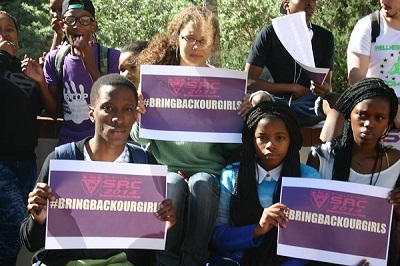
As a researcher in the area of gender-based violence and as co-ordinator of the Rhodes University Silent Protest, I was recently asked to address a student protest calling for the rescue and return of the more than 200 girls and young women abducted in Nigeria by Boko Haram. While I welcomed the opportunity to stand in solidarity with the SRC, the students and people across the world in calling on those with the power to act to do so, I was also struck by the complexities, nuances and challenges of the situation and of responding to it in the way we were. I wondered how to acknowledge these concerns with a critical slant, on this particular platform, to this particular audience and in a speech of just a few minutes. It also didn’t help that I was given less than 24 hours notice prior to the protest. This was my speech. I offer it to open up further conversation, critique and discussion.

“We are gathering today to publicly express our condemnation of an atrocity. We want to say that the abduction of any person, woman or man, adult or child, is unacceptable. But the sheer scale and arrogance of this abduction of young Nigerian girls has horrified people across the world and we fail to understand why meaningful action has not yet been taken.
We gather today, as others are gathering in other places around the world, to implore the government of Nigeria, our leaders here in South Africa, more broadly in Africa and leaders internationally to act wisely and strategically and swiftly to prevent further abductions and to find the stolen girls and bring them home. We beg them to use every bit of influence and power they have to address as a matter of great urgency the underlying problems which are destabilising countries across Africa and creating a context in which such actions are possible. We appeal to religious leaders to speak out against fundamentalist ideologies which inform such actions. Because this is not an isolated incident. This one has made international headlines but rape, abduction, torture and death are a daily reality for women, for men and for children in many parts of our world that are unstable or at war, and particularly on our continent. Even closer to home, right here in South Africa, in the Eastern Cape, in Grahamstown, women’s lives, children’s lives, men’s lives are shaped by the threat of violence and violation.
How do we begin to make sense of this? Who is the enemy? Is it simply a few evil people doing evil deeds and if we deal with them the problem will go away? I want to suggest that the enemy is the systems of thinking and belief in our own heads. Systems of thinking that assign different value to different people based on where they were born, the colour of their skins, what they believe or the parts of their body that they were born with. Patriarchy is one of those systems of thinking. Patriarchy assigns us each a role in society based on our biology, our sex. It sets up expectations and limitations and assigns us each a value, a place in the hierarchy. In a patriarchal system, adult men are positioned as dominant, women and children as subordinate, of lesser value. In a patriarchal system the abduction, rape or other violation of girls or boys can be justified – they are expendable objects. While men seem to benefit from this system, I would argue that in the end we all lose out. When we deny someone else their full humanity, we deny our own and we are made smaller. Patriarchy is alive and well not only in Nigeria, but here in South Africa. It is alive and well even in our own heads – we are all influenced by the society in which we live and grow. It takes awareness and conscious effort to begin to challenge our own thinking.
The Silent Protest has been raising awareness about sexual violence in the context of patriarchy for the past 8 years. We will do so again on 1 August this year. But just as importantly, the Silent Protest is an expression of solidarity and care for all survivors of gendered violence. We therefore stand in solidarity today with the young women abducted by Boko Haram and with their families and community. We are connected to them, as part of the same human family. We feel pain because they are hurting. And in our pain we cry out to those who are in a position to hear and act: Bring our girls home and work tirelessly towards lasting peace and security in Nigeria.”
By Kim Barker
